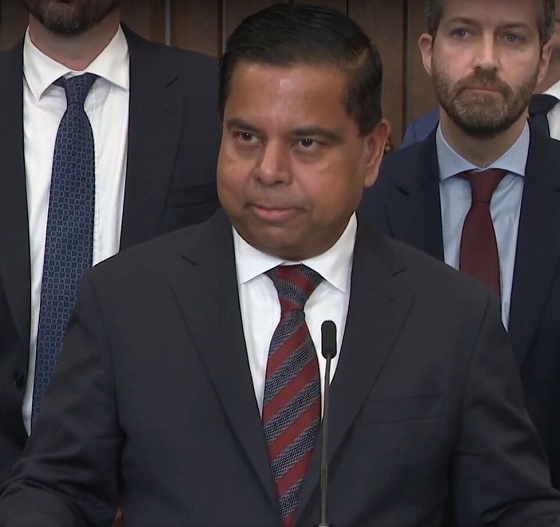Great Reset
From Border Security to Big Brother: Social Media Surveillance

 By Christina Maas
By Christina Maas
Was the entire immigration reform rhetoric just a prelude to broadening government spying?
Let’s take a closer look: immigration became a hot-button campaign issue, with plenty of talk about “welcoming” migrants, combined with a healthy dose of hand-wringing about border security. Now, however, critics are uncovering what looks like the real priority—an enhanced federal surveillance operation aimed at monitoring not just new arrivals, but American citizens too. In the name of keeping tabs on who’s coming and going, the administration sank more than $100 million into a social media surveillance system designed to keep an eye on everyone.
The Department of Homeland Security (DHS) first flirted with these powers under Trump’s presidency, when ICE officials began monitoring social media under the guise of protecting the homeland. The Biden-Harris administration, having previously expressed horror at Trump-era excesses, took a softer tack, but actually increased mass surveillance. They rebranded the initiative as the Visa Lifecycle Vetting Initiative (VLVI), a name that practically exudes bureaucratic charm while implying a methodical, visa-centric approach. But if it was just an immigration program, why was it scanning communications between Americans and their international friends, family, or business contacts?
According to a lawsuit from the Electronic Frontier Foundation (EFF), the program evolved into something much larger than a mere visa vetting system. The scheme entailed broad surveillance of communications and social media activity, conveniently sidestepping pesky things like “probable cause” or the First Amendment. “Government officials peering through their correspondence with colleagues visiting from overseas and scrutinizing the opinions expressed in their communications and their work,” read a lawsuit that laid bare the VLVI’s invasive nature. What started as a system to vet foreigners’ eligibility to enter the U.S. quietly metastasized into an excuse to monitor anyone who dared connect across borders.
We obtained a copy of the lawsuit for you here.
We obtained a copy of documents batch one for you here.
We obtained a copy of documents batch two for you here.
Of course, in true Washington style, this story wouldn’t be complete without a twist of political theater. The administration’s rhetoric has leaned heavily on a supposed dedication to protecting civil rights and personal freedoms—while simultaneously doubling down on programs that do the opposite.
A Little Privacy, Please? DHS Puts American Social Media on the Watchlist
Ah, the Fourth Amendment — one of those quaint, old-timey Constitutional protections that grant Americans the basic human right not to be poked, prodded, or probed by their own government without a solid reason. It’s a promise that Washington will think twice before sifting through your life without a warrant. Yet somehow, in the age of social media, this Fourth Amendment right seems to be slipping into the hazy realm of memory, particularly when it comes to Uncle Sam’s latest pastime: keeping tabs on everyone’s online chatter under the banner of immigration vetting.
Welcome to the VLVI, a Homeland Security special that appears to have mistaken “security” for “surveillance.” This bureaucratic marvel was dreamed up as a means to monitor non-citizens and immigrants, ostensibly for national security. But according to recent lawsuits, it’s not just foreigners on the watchlist—average Americans now get to share the surveillance limelight too, all thanks to the Department of Homeland Security’s fondness for “indiscriminate monitoring” of citizen communications. And why? Because in the brave new world of VLVI, any American chatting online with an overseas connection might just be suspicious enough to keep an eye on.
A Sweeping “Security” Measure or Just Mass Surveillance?
Here’s where the Constitution starts to feel like an afterthought. Traditionally, the government can’t simply jump into your emails, texts, or online rants without a warrant backed by probable cause. The Fourth Amendment makes that pretty clear. But in the VLVI’s playbook, this notion of “probable cause” becomes something of a suggestion, more of a “nice to have” than a constitutional mandate. Instead, they’ve embraced an approach that’s less “laser-focused security effort” and more “catch-all dragnet,” casting wide nets over American citizens who happen to connect with anyone abroad—no illegal activity necessary.
Imagine you’re a US citizen messaging your friend in France about a summer trip, or maybe you’re just exchanging memes with a cousin in Pakistan. Under this initiative, that simple exchange could land you in a Homeland Security database, your innocent messages cataloged alongside the truly suspicious characters of the internet. And this is happening without any individual warrants, without specific suspicion, and in some cases, without probable cause. One might ask, exactly how does that square with the Constitution’s protections?
Privacy Protections? That’s for Other People
This is all a question of government trust and hypocrisy. The program began under a previous administration but was quickly shuttled along by the current one, despite its public stance championing privacy rights. There’s something ironic about politicians who rally for civil liberties in campaign speeches, only to maintain and expand government surveillance in office. The backlash has been predictably loud, and for good reason. Here we have a policy that effectively treats every social media user as a latent threat and a government that somehow expects people to swallow this as reasonable.
Critics have slammed this “watch-all” approach, pointing out that it doesn’t take a legal scholar to see how this might just cross a constitutional line or two. It’s not just Americans with foreign friends who are worried—it’s anyone who believes the government shouldn’t rummage through citizens’ lives without cause. “This type of program, where citizens’ digital lives are surveilled under a sweeping policy without individual warrants or specific reasons, sounds like an unreasonable search,” privacy advocates say.
The Price of a Free Society: Now With Less Freedom
Of course, VLVI supporters wave away these concerns with a dismissive “it’s for security” mantra as if that excuse covers every constitutional breach. And true, there’s little doubt that some level of monitoring is necessary to keep the truly dangerous elements out of the country. But we’re talking about ordinary people here, law-abiding citizens getting swept up in a bureaucratic machine that fails to distinguish between a casual chat and a credible threat.
When the government can tap into anyone’s social media profile because of a flimsy association, what’s left of the citizen’s “reasonable expectation of privacy”? In theory, the Fourth Amendment protects it; in practice, programs like VLVI gnaw away at it, one seemingly “harmless” violation at a time. If we keep pretending this is just another harmless tool in the security toolkit, we might as well hang up any remaining illusions about the privacy rights we’re supposedly guaranteed.
Just Another Step Toward a Surveillance State?
For Americans, it’s a chilling reminder that a swipe on Instagram or a chat on Facebook can mean more than just casual social interaction. For the DHS, it seems the message is clear: treat everyone as a suspect first, and figure out the legalities later. What happens to the expectation of privacy for ordinary Americans? It’s probably time we all start looking over our digital shoulders, because in the world of VLVI, “reasonableness” is a government privilege, not a citizen’s right.
Business
Justice Centre launches new petition: Keep cash legal and accessible. Stop Bill C-2

Public Safety Minister Gary Anandasangaree speaks to Bill C-2 (Screenshot from CBC video)
The Justice Centre for Constitutional Freedoms has launched a petition calling upon the Prime Minister of Canada to strike the criminalization of cash payments of $10,000 or more from Bill C-2 and to introduce legislation protecting the right of Canadians to use cash of any amount for legal transactions.
Public Safety Minister Gary Anandasangaree introduced Bill C-2, or the Strong Borders Act, in the House of Commons on June 3, 2025. According to a Government of Canada statement, Bill C-2 will equip law enforcement with tools to secure borders and to combat crime, the drug trade, and money laundering.
Buried deep within the Bill, however, are provisions that would make it a criminal offence for businesses, professionals, and charities to accept cash payments of $10,000 or more in a single transaction or in a series of related transactions.

Bill C-2 at page 59
Justice Centre President John Carpay warns that the criminalization of cash transactions threatens the privacy, freedom of expression, and autonomy of all Canadians. When cash transactions are criminalized, governments, banks, and law enforcement can track and interfere with legitimate purchases and donations.
“We must not criminalize everyday Canadians for using physical currency. Once $10,000 is criminalized, it will be all too easy for future governments to lower the threshold to $5,000, then $1,000, and eventually nothing.”
Bill C-2 is just one point in a concerning anti-cash trend in Canada.
Quebec’s controversial Bill 54, passed into law in March 2024, allows police to assume that any person carrying $2,000 or more in cash is connected to criminal activity. Officers can seize the cash, and citizens must prove their innocence to get the cash back.
“Restricting the use of cash is a dangerous step towards tyranny,” continued Mr. Carpay. “Cash protects citizens from surveillance by government and banks, credit card companies, and other corporations. In a free society, violating the right of law-abiding citizens to use cash is not the answer to money laundering or the drug trade.”
Signers of the petition call upon the Prime Minister of Canada to strike the criminalization of cash payments from Bill C-2.
Signers of the petition also call upon the Prime Minister of Canada to introduce legislation that protects Canadians’ right to use cash of any amount for legal transactions.
Business
Telegram founder Pavel Durov exposes crackdown on digital privacy in Tucker Carlson interview

From LifeSiteNews
By Robert Jones
Durov, who was detained in France in 2024, believes governments are seeking to dismantle personal freedoms.
Tucker Carlson has interviewed Telegram founder Pavel Durov, who remains under judicial restrictions in France nearly a year after a surprise arrest left him in solitary confinement for four days — without contact with his family, legal clarity, or access to his phone.
Durov, a Russian-born tech executive now based in Dubai, had arrived in Paris for a short tourist visit. Upon landing, he was arrested and accused of complicity in crimes committed by Telegram users — despite no evidence of personal wrongdoing and no prior contact from French authorities on the matter.
In the interview, Durov said Telegram has always complied with valid legal requests for IP addresses and other data, but that France never submitted any such requests — unlike other EU states.
Telegram has surpassed a billion users and over $500 million in profit without selling user data, and has notably refused to create government “backdoors” to its encryption. That refusal, Durov believes, may have triggered the incident.
READ: Arrest of Telegram founder Pavel Durov signals an increasing threat to digital freedom
French prosecutors issued public statements, an unusual move, at the time of his arrest, fueling speculation that the move was meant to send a message.
At present, Durov remains under “judicial supervision,” which limits his movement and business operations.
Carlson noted the irony of Durov’s situating by calling to mind that he was not arrested by Russian President Vladimir Putin but rather a Western democracy.
Former President of Russia Dmitry Medvedev has said that Durov should have stayed in Russia, and that he was mistaken in thinking that he would not have to cooperate with foreign security services.
Durov told Carlson that mandates for encryption “backdoors” endanger all users, not just suspects. Once created, such tools inevitably become accessible to hackers, foreign agents, and hostile regimes.
“In the US,” he commented, “you have a process that allows the government to actually force any engineer in any tech company to implement a backdoor and not tell anyone about it.”
READ: Does anyone believe Emmanuel Macron’s claim that Pavel Durov’s arrest was not political?
Durov also pointed to a recent French bill — which was ultimately defeated in the National Assembly — that would have required platforms to break encryptions on demand. A similar EU proposal is now under discussion, he noted.
Despite the persecution, Durov remains committed to Telegram’s model. “We monetize in ways that are consistent with our values,” he told Carlson. “We monetized without violating privacy.”
There is no clear timeline for a resolution of Durov’s case, which has raised serious questions about digital privacy, online freedom, and the limits of compliance for tech companies in the 21st century.
-

 Health18 hours ago
Health18 hours agoLast day and last chance to win this dream home! Support the 2025 Red Deer Hospital Lottery before midnight!
-

 Business2 days ago
Business2 days agoCarney’s European pivot could quietly reshape Canada’s sovereignty
-

 Aristotle Foundation21 hours ago
Aristotle Foundation21 hours agoThe Canadian Medical Association’s inexplicable stance on pediatric gender medicine
-

 conflict1 day ago
conflict1 day ago“Evacuate”: Netanyahu Warns Tehran as Israel Expands Strikes on Iran’s Military Command
-

 Alberta2 days ago
Alberta2 days agoAlberta’s grand bargain with Canada includes a new pipeline to Prince Rupert
-

 Energy24 hours ago
Energy24 hours agoCould the G7 Summit in Alberta be a historic moment for Canadian energy?
-

 Bruce Dowbiggin23 hours ago
Bruce Dowbiggin23 hours agoWOKE NBA Stars Seems Natural For CDN Advertisers. Why Won’t They Bite?
-

 Crime23 hours ago
Crime23 hours agoMinnesota shooter arrested after 48-hour manhunt





